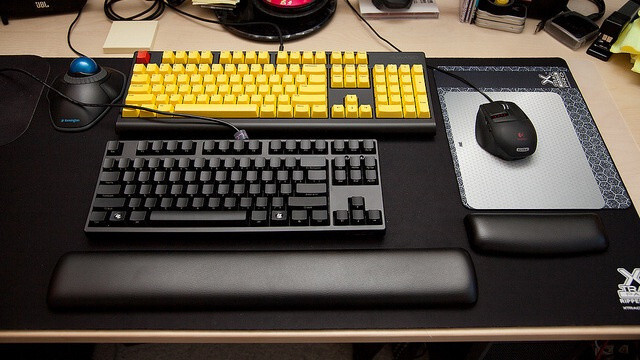
As anyone who grew up with old-school computers can tell you, the accessories we used back then were nothing like the ones everyone is used to nowadays.
Learning to type on those early keyboards was a completely different experience. The clicking and clacking of the keys made you feel like you were actually learning to be a typist, unlike the keyboards of today where everything sounds pretty much the same.
Recently, there has been a surge in the popularity of mechanical keyboards. While some think that they are quite expensive, the truth is that you can easily find great mechanical keyboards under $100.
If you have seen those words but have no idea why you may want one for yourself, then read on to find out more.
What are mechanical, membrane, and chiclet keyboards?
Most modern keyboards nowadays are either membrane or chiclet keyboards. Without delving too much into how they work, both types of keyboards provide little to no physical feedback to the user. This is especially true of the former category, which is also the most common type.
On the other hand, mechanical keyboards (or more accurately, mechanical-switch) keyboards, contain a complete switch system underneath each key which contains a base, a spring, and a stem. As such, they provide satisfying physical feedback which can even be customized.
There are three types of switches based on their behavior:
- Linear – For consistent resistance and a smooth typing experience.
- Tactile-only – Which produce tactile (non-audible) feedback when pressed.
- Tactile with audio – Which produce both tactile and audio feedback.
When shopping around, however, you will most likely come across switches divided into other types of categories instead. For instance, some of the Cherry MX switches, which are possibly the most popular in the world, can be divided into:
- Black : They have a medium to high actuation force, at 60 cN, which means they are the stiffest of the four most common Cherry switches.
- Brown: Tactile, a sort of bridge between the red and black switches, the brown switches provide tactile feedback but are easier to press and are not as loud.
- Red: They have a low actuation force, at 45 cN – tied with Brown for the lowest of the four most common switches. Red switches have been marketed as a gaming switch, with the light weighting allowing for more rapid actuation, and have become increasingly common in gaming keyboards.
- Blue: Tactile with audio, which are much more reminiscent of the days of old with that “clicky” sound in every keystroke. Blue switches are favoured by typists due to their tactile bump and audible click.
So now that you know some things about mechanical keyboards, here are some reasons why you might want to buy one.
You will get better at typing
For those of who are struggling with typing fast or without errors, a mechanical keyboard can work absolute wonders. The tactile feedback which some types of switches can produce are fantastic for learning how to type.
Once you get used to a mechanical keyboard, you will start noticing the actual press of each key. You will start to have a much better understanding of where your fingers are resting and whether a key is pressed or not.
In essence, you will become better at typing.
You will be able to customize the keyboard to your liking
One major difference between mechanical and membrane (or chiclet) keyboards is that the former are fully customizable. Virtually every key can be replaced, which means that you can not only customize switches based on their tactile feedback (or lack thereof) but also based on their looks.
Mechanical keyboard setups are some of the most colorful ones you can find. That level of personalization is a fantastic experience of its own and you might even find yourself searching for more unique keys all over the Internet.

A mechanical keyboard can last for decades
Most standard membrane keyboards can last for about 1 million keystrokes, though higher-end keyboards do last considerably longer. That number is quite substantial so any keyboard should last for a few years.
However, standard keyboards are prone to many different faults and errors and once they are done, they are done. Replacing parts is not practical, so you will need a new keyboard.
Mechanical keyboards, on the other hand, can last for about 50 million keystrokes or more. They are easy to clean and maintain and when a key breaks, replacing it is extremely easy. The truth is, you are likely to use the same mechanical keyboard until you can even pass it on to your kid.
Get the TNW newsletter
Get the most important tech news in your inbox each week.




